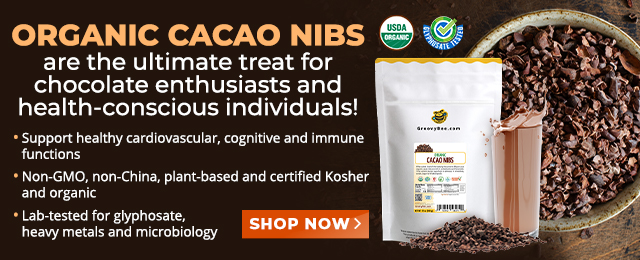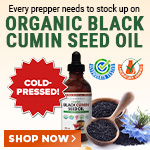
Fava Beans: Great for Hormone Replacement With Anti-Cancer Potential
Monday, January 07, 2008 by: Kal Sellers
Tags: fava beans, anti-cancer foods, health news
- BIRD FLU SCAM: Neither CANADA nor MEXICO have killed a single chicken due to Bird Flu because mysteriously Bird Flu DOES NOT CROSS BORDERS
- “Children of the Matrix”: Unveiling the hidden controllers of human history
- Modern science uncovers brain-boosting power of ancient spice coriander and its key compound linalool
- Governments worldwide are struggling to contain a NEW VIRUS impacting BILLIONS OF LIVES worldwide known as TRUTH
- Injected allergies: How vaccines may be rewiring the immune systems and fueling the food allergy epidemic
- Peter Rost exposes Big Pharma corruption in his book “The Whistleblower: Confessions of a Healthcare Hitman”
- Sermon 30: How Jesus reveals Caesar’s FAKE CURRENCY and FALSE AUTHORITY
- RFK Jr.'s SSRI antidepressant investigation sparks liberal meltdown, exposes Big Pharma's dangerous game
- Soros-backed District Attorney accuses Alex Jones of “exploiting” unsolved murder of Infowars journalist Jamie White, sparking suspicions
- Ballot drop boxes set ablaze in Oregon and Washington, prompting security concerns ahead of election
- Israeli soldiers accused of even more torture and abuse in the West Bank
- Jimmy Kimmel ‘illegally’ tells Trump voters they can wait until Friday
- Pilots report mysterious lights 'moving at extreme speeds' across Oregon skies
- Attorney and TikTok influencer explains how he was offered hundreds of dollars to make false claims about Trump, Republicans
- RFK Jr. exposes the hidden dangers of bird flu vaccines in poultry
- House Intelligence Committee calls for the ARREST and PROSECUTION of Dr. Anthony Fauci
- Sugarcane extract superior to cholesterol-lowering drugs?
- RFK Jr. dismantles ideological HHS grants targeting “vaccine hesitancy” — signaling a new era of scientific integrity
- California's social media censorship law struck down: A victory for free speech or a threat to online safety?
- The Health Ranger releases “Vaccine Zombie” song and music video, using AI-animated zombies for the music video
- Former horse rancher and 6,000 other plaintiffs are suing Syngenta after paraquat exposure led to Parkinson's Disease
- Modern science uncovers brain-boosting power of ancient spice coriander and its key compound linalool
- EPA advisor admits the agency is funneling billions to climate groups ahead of Trump’s return to White House
- Ballot drop boxes set ablaze in Oregon and Washington, prompting security concerns ahead of election
- Michigan sheriff announces criminal investigation into 2020 election crimes, Dominion Voting Systems
- Israeli soldiers accused of even more torture and abuse in the West Bank
- Peter Rost exposes Big Pharma corruption in his book “The Whistleblower: Confessions of a Healthcare Hitman”
- Migrants are taking advantage of recent hurricanes to scam residents and loot their homes
- Russia warns citizens against traveling to the United States, Canada and the European Union
- House Intelligence Committee calls for the ARREST and PROSECUTION of Dr. Anthony Fauci
- Rep. Nancy Mace introduces bill to ban biological males from female facilities on federal property
- Florida takes a stand: DeSantis proposes permanent ban on mRNA vaccine mandates
- Jimmy Kimmel ‘illegally’ tells Trump voters they can wait until Friday
- Sermon 30: How Jesus reveals Caesar’s FAKE CURRENCY and FALSE AUTHORITY
- Mike Adams releases music poetry sensation: A Child of God
- Mike Adams releases new song and music video: Nothing More Disgusting Than a Globalist
- EPA advisor admits the agency is funneling billions to climate groups ahead of Trump’s return to White House
- RFK Jr. clears key hurdle: Sen. Susan Collins backs controversial HHS nominee, signaling a new era for health policy
- The Health Ranger releases “Vaccine Zombie” song and music video, using AI-animated zombies for the music video
- Congratulations to the FULLY UNVACCINATED as you resisted the COVID-19 PROPAGANDA MACHINE fueled by over $100 BILLION
- DIRTY VACCINES: Dr. Anthony "Fraudulent" Fauci, King of the Covid scamdemic, admits "We don't do placebo trials on vaccines"
- Global leaders unite to clamp down on “misinformation” with UN-backed Cascais Declaration
- Fake "CLIMATE CHANGE" will continue to devastate any regions the globalists and ruling elite want to purchase at a discounted price
- The pandemic as a tool for INDOCTRINATION: Understanding “The Indoctrinated Brain” by Dr. Michael Nehls
- Trump administration takes on global censorship: A new frontier for free speech advocacy
- Mint: The ancient herb that refreshes, soothes and heals
- South Korean banks halt silver bar sales amid global and domestic uncertainty
- Mike Adams releases new song and music video: Nothing More Disgusting Than a Globalist
- Ex-FBI Chief EXPOSES disgraceful government coverups of Oklahoma City Bombing, Kennedy assassinations, 9/11 WTC, and "Terrorism" as plot to destroy Constitution
- Federal judge backs Trump's mass firings, clearing path for government downsizing
- Trump's impressive political comeback against all odds makes headlines around the world
- Democrats cry as “liberal supply chains” are wiped out and their favorite multi-billion dollar money machine is shut down
- Deep State Power Grab? Corporate Transparency Act threatens nonprofits and small businesses – Andy Schlafly discusses potential impacts with Mike Adams
- Mike Adams releases country western hit single: Goin’ Back in Time is Comin’ Home
- Red Cross issues warning to stop blood plasma donations from vaccinated people
- Scientists confirm: GENIUS brain function can be spontaneously unleashed in humans without any apparent cause
- HYSSOP: What research reveals about the health benefits of this ancient holy herb
- EPA advisor admits the agency is funneling billions to climate groups ahead of Trump’s return to White House
- Two containers with completed ballots fall out of truck in Florida
- Fully vaccinated about to see “tsunami” of illness and death, warns virologist
- Today I asked our AI language model “Neo” about which phytonutrients or phytochemicals can block the spike protein related to SARS-CoV-2 … Here is what it answered…
- Global leaders unite to clamp down on “misinformation” with UN-backed Cascais Declaration
- DATA: England’s vaccinated population had close to one million deaths in 23 months; unvaccinated population had less than 61,000 deaths over the same period
- BREAKING: 2025 NDAA authorizes mandatory military draft of WOMEN across America… as Pentagon pursues global NUCLEAR war with both Russia and China at the same time
- ENGINEERED FAMINE: Oregon starts SHUTTING DOWN small farms “to protect the people”
- Michael Yon warns of a ZIONIST TAKEOVER in Trump’s second administration
- Ozempic and Wegovy weight loss drugs are injectable LIZARD VENOM PEPTIDES that may unleash a devastating wave of organ failure… side effects align with symptoms of SNAKE BITES
- BOMBSHELL: DNA testing kits are a SCAM to develop ethnic-specific bioweapons
- NASA admits that climate change occurs because of changes in Earth’s solar orbit, and NOT because of SUVs and fossil fuels
- These 13 countries just signed an agreement to engineer a global FAMINE by destroying food supply
- Coriander seeds: Ancient medicine backed by modern science
- Sermon 30: How Jesus reveals Caesar’s FAKE CURRENCY and FALSE AUTHORITY
For all of this, she complained that she was being driven crazy with hot flashes and did not want to go on hormone therapy. She decided to come see me professionally.
I spoke with her and quizzed her about her diet. She had been following our health program exactly. I figured that she just needed an infusion of plant based hormones.
I explained to her that plant hormones are the best protection in the world. They are large, weak structures that will fill up all the hormone binding sites and keep them satisfied as needed without ever reaching toxic strength. When your body releases hormones erratically (as happens during many times of life but especially during menopause) those hormones can be absent or can be at toxic levels. With plant hormones binding up the receptor sites all the time, you never even know that the levels are up or down and the potential toxic levels (which can cause estrogen-dependent cancer) are never reached.
The best part of all this, I told her, is that your body will stop working so hard at meeting hormonal needs and will get to rest and re-set itself to a new level of health.
I explained that if we all ate natural diets all the time, that we could not avoid huge amounts of plant hormones every day and that our bodies really are designed to get most of their hormone needs from the diet.
She, of course, wanted to know what to do.
I told her about fava beans. These are the most estrogen-dense food known. When sprouted, they become far more so, 3-30 times more.
I had her sprout dry fava beans (which took one afternoon in a bowl of water) and then low-heat them. Low heating is a technique perfected in Traci's Transformational Kitchen Cookbook and Traci's Transformational Health Principles, which allows the bean to stay alive (in fact it will grow during the process and in the fridge thereafter) while softening the hard exterior.
She was then to blend them with a little extra virgin olive oil and seasonings to make a smooth savory "soup". She was to eat at least 1/4 cup every day.
She actually blended them with tomatoes and onions when she did it for real. She had it for dinner and then that night she got sick. I have never seen this before or since. She stayed sick for that night and was a little queasy the next day. After that she stopped having hot flashes. She went a whole year without having hot flashes and then, when they began again, she began eating 1/2 cup of edamame three or four times per week. She has been hot-flash free since that time.
Often today I read articles that are leading the readers to believe that soy is the premier source of phyto-estrogens. Not so at all. Further, many people are reacting to soy as a food reaction and their health gets damaged by it. Besides this, soy protein (which is what many people are using) is a by-product of making soybean oil and is very chemical rich.
Edamame, a green soybean, has none of the drawbacks and most people will not react to it even if they are allergic to dry soybeans and soy products.
Still, fava beans are the best source. They are usually experienced as tasty and are easy to digest. When sprouted, they become the best phyto-estrogen supplement known.
I have given fava beans to many people having hormone problems and I find them reliable relief. As with all sources of phyto-estrogens, fava beans are also somewhat anti-inflammatory.
Herbally (after all, this is an herbal medicine column), we use blessed thistle, black cohosh, kudzu root, wild yam, sarsaparilla, wheatgrass, red clover blossoms, alfalfa, vitex, dong quai and many others for herbal hormone foods. Most of these contain phyto-estrogens, wild yam and sarsaparilla contain steroidal saponins which are hormone building blocks.
I no longer reach first for the herbal aids, however, but recommend sprouted, low-heated fava bean soup.
About the author
Kal Sellers, MH currently operates KalsSchool.com and teaches a 2-year curriculum for Natural Medicine, via live teleclasses.Kal is a Master Herbalist and holds several other certificates and licenses for hands-on healing modalities. He maintains a current practice in the Atlanta area.
Kal and Traci have six children, the last four of which were delivered at home. They live now in Powder Springs, GA where they teach live classes on food and medicine. Kal is also a full time Chiropractic student.
Fava beans at FETCH.news
Get independent news alerts on natural cures, food lab tests, cannabis medicine, science, robotics, drones, privacy and more.
Take Action: Support Natural News by linking to this article from your website
Permalink to this article:
Embed article link: (copy HTML code below):
Reprinting this article:
Non-commercial use OK, cite NaturalNews.com with clickable link.
Follow Natural News on Facebook, Twitter, Google Plus, and Pinterest
Science News & Studies
Medicine News and Information
Food News & Studies
Health News & Studies
Herbs News & Information
Pollution News & Studies
Cancer News & Studies
Climate News & Studies
Survival News & Information
Gear News & Information
News covering technology, stocks, hackers, and more



"Big Tech and mainstream media are constantly trying to silence the independent voices that dare to bring you the truth about toxic food ingredients, dangerous medications and the failed, fraudulent science of the profit-driven medical establishment.
Email is one of the best ways to make sure you stay informed, without the censorship of the tech giants (Google, Apple, Facebook, Twitter, YouTube, etc.). Stay informed and you'll even likely learn information that may help save your own life."
–The Health Ranger, Mike Adams












































